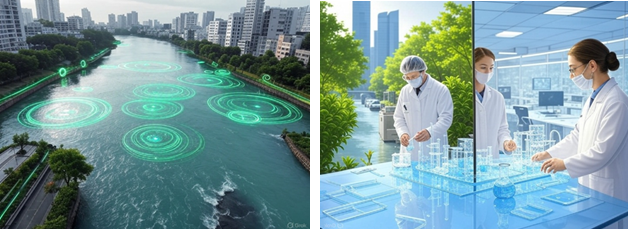AI-enhanced urban water quality monitoring
Effective monitoring for data-driven holistic management of urban water quality
The availability of clean water is essential for our society. Unfortunately, this is under increasing stress, especially in urban environments. The EU’s ambitions for a clean urban water environment, as outlined in the Zero Pollution Action Plan (ZEPA), aims at reducing health and environmental risks, and chemical and microplastic emissions with more stringent requirements for various water matrices. Fulfilling these ambitions requires collecting significant amounts of data to design, implement, and review different pollution control actions ranging from source control to end-of-pipe treatments. Furthermore, ever-increasing threats like emerging pollutants, new diffuse and point sources, climate change, socio-economic development, aging infrastructure, and leakages require an integrated perspective of the whole water cycle shared across multiple stakeholders and administrative entities. Managing these continuous threats to both water quality and quantity requires advanced monitoring strategies.
Research challenges
Multiple water quality monitoring solutions are available, but they fail to provide adequate information to support city-wide pollution control actions. Current lab-based sample analysis and sensors target only a few contaminants, are costly, difficult to install and maintain, require intensive data validation, and have limited spatial and temporal resolution. Modeling tools and digital twins of water infrastructure can compensate for these shortcomings, but they rarely assimilate real-time data and are affected by several sources of uncertainty. This project is part of a larger European collaboration (UrbanM2O) focused on three cities: Copenhagen, Zürich, and Barcelona. Affordable sensors will be installed by five innovative companies to monitor parameters for several use cases, primarily measuring effluent, surface water, and groundwater. Three universities will collect and analyze laboratory data. Our challenge is to fuse the sensor data and, using laboratory data, generate new opportunities for water quality parameter estimation.
Your assignment
The project aims to develop AI-enhanced, resource-effective monitoring tools for urban water quality. You will achieve this by coupling existing sensors with AI methodologies to enhance their capabilities to monitor new pollutant threats. You will perform system identification for the pilot sites, which helps the estimation of concentrations, flows and model parameters by fusing the sensor data. You will develop virtual sensors using data from laboratory measurements collected by partner universities at the pilot sites. After this first phase, you will identify important missing processes, and study optimal sensor placement. This starts a second phase of improved sensor deployment at the pilot sites. You will validate the functionality of the virtual sensors at the pilot sites. An important aspect is communicating with many partners within our European collaborative network. You will have to travel a few times per year for meetings at partner locations in Europe.
Your profile
You have a master’s degree in chemical engineering, (bio)process engineering, environmental engineering, or equivalent. You have a passion for modeling and want to understand systems. You are an independent, critical-thinking, motivated student with an affinity for multidisciplinary research. You like working in a dynamic, international environment and enjoy tackling challenges as they arise.
Keywords: AI-enhanced monitoring; Urban water quality; Data fusion; Virtual sensors; Pollution control
Supervisory team:
prof. dr. ir. K.J. Keesman (Wageningen University, Mathematical and Statistical Methods – Biometris); Wetsus supervisor: dr. ir. R.M. Wagterveld (Theme coordinator Monitoring & Quality)
Project partners: Monitoring & Quality
Only applications that are complete, in English, and submitted via the application webpage before the deadline will be considered eligible.
Guidelines for applicants: https://phdpositionswetsus.eu/guide-for-applicants/
